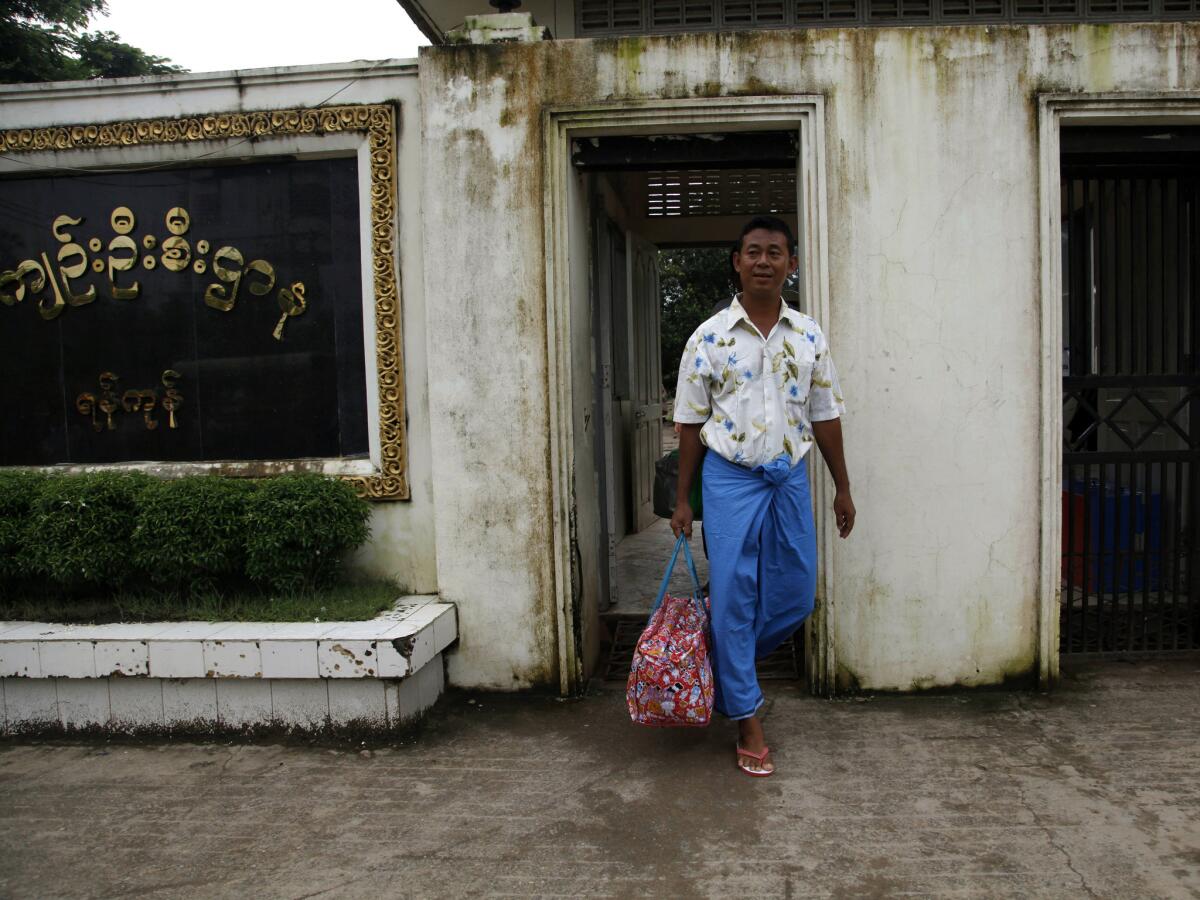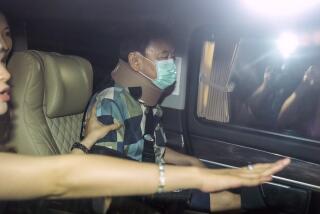Myanmar begins new round of political-prisoner releases

NEW DELHI – Myanmar started releasing approximately 70 political prisoners Tuesday, days after President Thein Sein promised during a European tour to free all remaining prisoners of conscience by the end of the year.
Civic society groups countered that Tuesday’s releases, along with earlier waves, have been done largely for public relations and don’t reflect substantive changes in the country’s human-rights or rule-of-law practices. Furthermore, critics say, the government continues to arrest whistle-blowers fighting corruption along with farmers and activists resisting illegal seizures and the environmental degradation of their land.
“We welcome the release,” said Bo Kyi, joint secretary of the Thailand-based Assistance Assn. for Political Prisoners in Myanmar, an activist group. “But we’re concerned that they continue to arrest people.”
A further concern is that many of the repressive laws that landed prisoners in jail to begin with, including some who received decades-long sentences, remain largely in place, with limited progress so far on reforming broadly worded statutes.
“There’s a lot of rhetoric, but not much progress,” said Phil Robertson, deputy director of Human Rights Watch’s Asia division. “People are still being detained under laws on the book for quite some time. They need to be taken off the books.”
Authorities in Myanmar, also known as Burma, have been keen to shed a reputation built up over decades for routinely violating human rights, analysts said, and see prisoner releases as a way to ease U.S. and European criticism and open the door to much-needed loans and business deals.
The number of remaining political prisoners in Myanmar is a matter of some dispute, given differences in what constitutes a political prisoner and poor record-keeping in the nation’s network of 42 prisons and 109 labor camps.
Bo Kyi said up to 200 prisoners remain in prison, some sentenced and others still awaiting a verdict. Other groups placed the total at around 80 after Tuesday’s release, down from an estimated 2,100 three years ago.
The military junta, which ruled the country with an iron grip for decades, long argued that Myanmar had no political prisoners, only common criminals. Thein Sein’s recent tour to London and Paris was aimed at bolstering the country’s flagging reputation after several outbreaks of communal violence that frequently involved attacks by the Buddhist majority on members of Muslim minority communities.
In a speech last week in London, the president vowed an end to “prisoners of conscience” by the end of the year, which he termed an essential step in the country’s transition to democracy.
Since the nominal end of a half century of military rule in 2011, Thein Sein’s administration has freed hundreds of prisoners, eased media restrictions, allowed opposition leader Aung San Suu Kyi to run successfully for parliament and ended a ban on campaigning by her National League for Democracy party.
These reforms have prompted the European Union to scrap most of its economic and trade sanctions against Myanmar, except for an embargo on weapons sales, and to extend preferential trade terms to the Southeast Asian nation. Washington has also lifted most sanctions, with many American and other foreign companies keen to enter the resource-rich nation, which they see as a frontier market with approximately 60 million future customers.
But the military still has inordinate influence in the country. Many lawmakers are former generals or ex-junta officials, while Myanmar’s controversial constitution guarantees that 25% of all parliamentary seats are held by the military and effectively bars the hugely popular Suu Kyi from becoming president.
ALSO:
At least six killed in clashes near Cairo University
Royal baby’s relatives ‘overjoyed,’ but what did world say?
In Mexico, dozens fall to new violence across 4 troubled states
mark.magnier@latimes.com
Tanvi Sharma in The Times’ New Delhi bureau contributed to this report.
More to Read
Sign up for Essential California
The most important California stories and recommendations in your inbox every morning.
You may occasionally receive promotional content from the Los Angeles Times.










